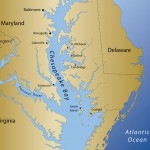 MARYLAND – Two fishermen plead guilty Friday to conspiring to violate federal laws by illegally harvesting and selling striped bass, and both are now facing up to five years in prison, federal officials said.
MARYLAND – Two fishermen plead guilty Friday to conspiring to violate federal laws by illegally harvesting and selling striped bass, and both are now facing up to five years in prison, federal officials said.
Michael D. Hayden, 41, and William J. Lednum, 42, both of Tilghman Island, Maryland, of “systematically plundering” Chesapeake Bay of a protected resource, according to officials.
“These defendants admitted to systematically plundering the Chesapeake Bay of an important and protected natural resource, and at the expense of the many honest fishermen who play by the rules,” said Acting Assistant Attorney General Sam Hirsch.
Officials said Hayden and Lednum shipped and sold $498,293 worth of striped bass to wholesalers in New York, Pennsylvania, Delaware and Maryland. None of the fish was properly reported at check-in stations or on the permit allocation cards of daily catch records submitted to the state of Maryland, officials said.
Maryland in turn submits such paperwork to numerous federal and interstate agencies responsible for setting harvest levels all along the eastern seaboard.
The defendants have agreed to pay restitution to the state of Maryland of between $498,293 and $929,625. The defendants have further agreed to forfeit the monetary equivalent of 80 percent of the value of the vessel primarily used during the conspiracy.
U.S. District Judge Richard D. Bennett scheduled sentencing for Hayden and Lednum in November.
According to their plea agreements, these are the facts:
- Hayden and Lednum were “captains” on fishing vessels owned by them, William J. Lednum Fisheries d/b/a Michael D. Hayden Jr. and Michael D. Hayden, Jr., Inc.
- The defendants also employed numerous “helpers” as part of this scheme, including co-defendant Kent Sadler.
- From at least 2007 to 2011, Hayden and Lednum illegally harvested, possessed, falsely labeled and/or sold at least 185,925 pounds of striped bass.
- They used illegally weighted and/or anchored gill nets, left the nets in the water overnight, and set the nets during times when the commercial striped bass gill-netting season was closed.
- The defendants exceeded their maximum daily vessel limit of striped bass and either unloaded the surplus onto an anchored vessel or paid others a fee to check-in fish for them.
- Hayden and Lednum falsified the permit allocation cards and daily catch records for their striped bass fishing trips to over-report the numbers of striped bass caught and under-report the weights.
- This allowed them to request additional state tags under false pretenses and therefore harvest additional striped bass illegally.
This case was investigated by the Maryland Department of Natural Resources and the U.S. Fish and Wildlife Service.

